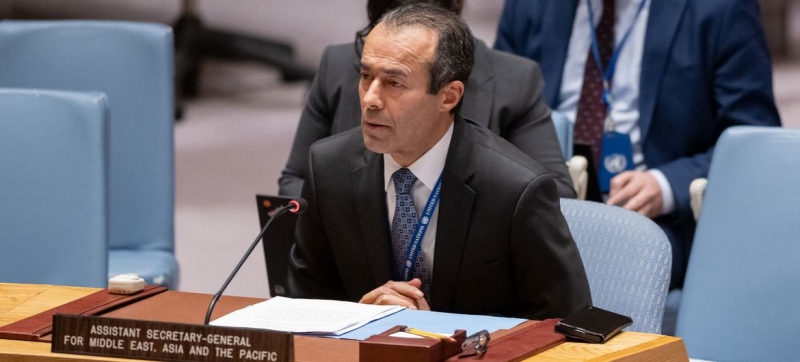
UN Assistant Secretary-General for Asia and the Middle East Khaled Khiari. UN Security Council hears report on situation in the Middle East Peace and Security
UN Assistant Secretary-General Khaled Khiari presented a detailed report to the Security Council on the situation in the Middle East in the context of the implementation of resolution 2334 (2016). He noted that violence in Gaza continues to escalate, the humanitarian crisis is worsening and people are dying.
The scale of violence
According to the Gaza Health Ministry, more than 45,000 Palestinians have been killed in the Strip since the conflict escalated on October 7, 2023, including thousands of women and children. In the past week alone, more than 250 people have fallen victim to Israeli airstrikes targeting densely populated areas, schools and hospitals. Among the most tragic incidents was an attack on a UNRWA school in Khan Younis, where 20 people were killed.
Khiari stressed that the situation continues to deteriorate, and the destruction in areas such as Jabalia, Beit Lahia and Beit Hanoun has made living conditions in these places unbearable. “The ongoing collective punishment of the Palestinian people is unacceptable. This destroys the foundation of international humanitarian law and deepens the humanitarian crisis,” he said.
Violations of International Humanitarian Law
Khaled Khiari condemned the actions of both sides in the conflict. He stressed that the attacks by Hamas on Israeli civilians on October 7, as well as the holding of more than 100 hostages, are unjustifiable. According to him, there is reason to believe that they are being subjected to sexual violence and abuse. “The hostages must be released immediately and without preconditions. Humane treatment is the minimum requirement of international law,” Khiari stressed.
At the same time, he pointed out Israel’s violation of the principles of humanitarian law. The use of explosive devices in densely populated areas of Gaza, according to the rapporteur, led to mass casualties and the destruction of infrastructure. “The use of force must be proportionate and exclude the suffering of the civilian population. “All those responsible for violating these principles must be held accountable,” he added.
Humanitarian Aid
Khiari noted that the ability to deliver humanitarian aid remains limited, and shortages of food, medicine and fuel are leading to an increase in deaths. People, especially internally displaced persons, are forced to live in overcrowded shelters without basic living conditions.
“Israel must fulfill its obligations as an occupying party. Immediate and unimpeded humanitarian access must be a priority for the international community,” he said.
“Any attempt to establish settlements in Gaza must be firmly rejected. There must be no attempt to reduce or annex Gaza in whole or in part,” the report emphasizes.
Tensions in East Jerusalem and the West Bank
The rapporteur also focused on the escalation of violence in East Jerusalem and the West Bank. He expressed concern over the increase in attacks by Israeli settlers, sometimes supported by Israeli security forces. At the same time, he said, clashes between Palestinian armed groups and Palestinian Authority security forces have become more frequent.
Quoting the provisions of the UN Secretary-General’s thematic report, Khiari condemned the demolition of Palestinian homes and Israel’s stated plans to further expand settlements, calling these actions “a violation of international law”. “All settlements in the occupied territories, including East Jerusalem, have no legal validity. They pose a serious threat to the future of the two-state solution,” he stressed.
Call for a Ceasefire
In his report, the UN chief also reiterated the call for an immediate humanitarian ceasefire and the immediate and unconditional release of all hostages in Gaza. The United Nations, Khiari said, is constantly engaging with all stakeholders to this end and stands ready to support the implementation of the agreement.
The UN, according to Khaled Khiari, remains committed to supporting the Palestinians and Israelis in ending the occupation and resolving the conflict in accordance with international law and the principle of two states living in peace within the pre-1967 borders, with Jerusalem as their capital.
